人教版七年级英语语法总结完整版
(完整版)人教版七年级上册英语全册语法知识点梳理,推荐文档

第一讲:动词一.Be 动词(am, is, are)的用法口诀:I 用 am , you 用 are ,is 连着他(he)她(she)它(it)。
单数全部用 is,复数一律都用 are. 变疑问,往前提,句末问号莫丢弃,变否定,更容易,be 后 not 莫忘记,句首大写莫迟疑。
I a student. You Japanese.He my brother. She very nice.My name Harry. LiLei very tall.This book very interesting. Li Lei and I good friends.These apples. Those bananas.They students. There some bread on the plate.The cat black. The black pants for Su Yang.Here some sweaters for you. There a girl in the room.There some milk for me. There some apples on the tree.Gao Shan's shirt over there. Some tea in the glass.二.一般现在时态1.用法:(1).表示习惯性,经常性的动作,常与o f t e n,a l w a y s,u s u a ll y,e v e r y d a y/w ee k/m o n t h…等词连用I o f t e n p l a y s o cc e r.(2).表示主语具备的性格或能力:H e li k e s t o e a t b a n a n a s.2.在一般现在时态中,当主语是第三人称单数时,谓语动词也用第三人称单数, 第三人称单数的构成规则(主语不是第三人称单数时谓语动词用原形):a.一般情况下在动词词尾加 s 如:get----gets like----likes play—plays, want—wants,work—works,b.以字母 s、x、ch, sh,o 结尾的动词加-es:guess—guesses, fix—fixes, teach—teaches,brush—brushes, go—goes,c.以辅音字母+y 结尾的动词,先变y 为i,再加-es:study—studies,carry—carries,fly—flies,特殊词: have --- has一写出下列动词的三单形式。
初一英语知识点人教版总结
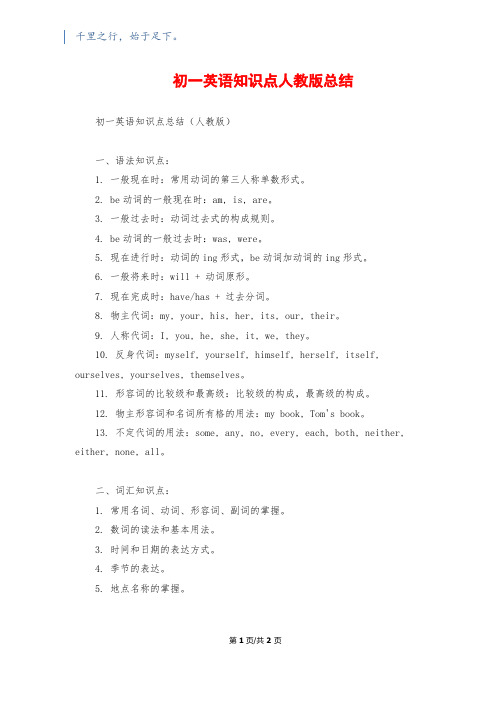
千里之行,始于足下。
初一英语知识点人教版总结初一英语知识点总结(人教版)一、语法知识点:1. 一般现在时:常用动词的第三人称单数形式。
2. be动词的一般现在时:am, is, are。
3. 一般过去时:动词过去式的构成规则。
4. be动词的一般过去时:was, were。
5. 现在进行时:动词的ing形式,be动词加动词的ing形式。
6. 一般将来时:will + 动词原形。
7. 现在完成时:have/has + 过去分词。
8. 物主代词:my, your, his, her, its, our, their。
9. 人称代词:I, you, he, she, it, we, they。
10. 反身代词:myself, yourself, himself, herself, itself, ourselves, yourselves, themselves。
11. 形容词的比较级和最高级:比较级的构成,最高级的构成。
12. 物主形容词和名词所有格的用法:my book, Tom's book。
13. 不定代词的用法:some, any, no, every, each, both, neither, either, none, all。
二、词汇知识点:1. 常用名词、动词、形容词、副词的掌握。
2. 数词的读法和基本用法。
3. 时间和日期的表达方式。
4. 季节的表达。
5. 地点名称的掌握。
第1页/共2页锲而不舍,金石可镂。
三、句型知识点:1. 陈述句的基本句型:主语+谓语+宾语。
2. 疑问句的基本句型:助动词/系动词/情态动词+主语+动词?3. 否定句的基本句型:主语+助动词/be动词/情态动词+not+动词原形。
4. be动词的疑问句和否定句的构成。
5. 以What/Who/Where/When/How开头的特殊疑问句的构成。
四、阅读技巧和写作要点:1. 阅读理解题的解题技巧。
2. 写作要点:选择合适的词汇和句型,注意语法和拼写错误,组织结构和内容的连贯性。
2024年初一(七年级)人教版英语语法知识点

2024年初一(七年级)人教版英语语法知识点1.词性(1)名词(Nouns):表示人、地点、事物或概念。
分为可数名词与不可数名词单数与复数(例如:cat-cats,water-不可数)(2)动词(Verbs):表示动作或状态。
分为实义动词与助动词动词的时态(一般现在时、一般过去时、将来时)(3)形容词(Adjectives):描述名词的性质或状态。
比较级与最高级(例如:big-bigger-biggest)(4)副词(Adverbs):描述动词、形容词或其他副词的方式、程度等。
(5)频率副词(如always,usually,sometimes,never)2.句子结构(1)简单句(Simple Sentences):只有一个主语和一个谓语的句子。
例如:I like ice cream.(2)并列句(Compound Sentences):由两个或多个简单句通过连词连接而成。
例如:I like ice cream,and she likes cake.(3)从句(Complex Sentences):包含一个主句和一个或多个从句。
例如:I will go to the park if it is sunny.3.时态(1)一般现在时(Simple Present Tense):表示习惯或经常发生的动作。
结构:主语+动词原形(第三人称单数加-s)例如:He plays football.(2)一般过去时(Simple Past Tense):表示过去发生的动作。
结构:主语+动词的过去式例如:They visited the museum.(3)将来时(Future Tense):表示将要发生的动作。
结构:主语+will+动词原形例如:She will go to school tomorrow.4.疑问句和否定句疑问句(Questions):一般疑问句:助动词+主语+动词原形例如:Do you like pizza?特殊疑问句:疑问词+助动词+主语+动词原形例如:What do you want to eat?否定句(Negative Sentences):结构:主语+助动词+not+动词原形例如:I do not like spinach.5.代词人称代词(Personal Pronouns):I,you,he,she,it,we,they物主代词(Possessive Pronouns):mine,yours,his,hers,its,ours, theirs反身代词(Reflexive Pronouns):myself,yourself,himself,herself, itself,ourselves,yourselves,themselves6.介词表示时间的介词:in,on,at例如:I was born in2005.表示地点的介词:in,on,under,between,behind 例如:The cat is under the table.7.连词并列连词:and,but,or从属连词:because,although,if,when8.常用短语表示喜欢或不喜欢的表达:I like/I don’t like...My favorite...is...表示能力的表达:I can/I can’t...9.常见错误注意主谓一致:如第三人称单数加-s。
最新英语人教版七年级上册全册重点句型语法

最新英语人教版七年级上册全册重点句型语法1. 主语 + be动词 + 宾语- 例句:I am a student.- 翻译:我是一个学生。
2. 主语 + be动词 + 形容词- 例句:She is tall.- 翻译:她个子高。
3. 主语 + be动词 + 名词- 例句:They are teachers.- 翻译:他们是老师。
4. 主语 + be动词 + 地点- 例句:We are at school.- 翻译:我们在学校。
5. 主语 + be动词 + 时间- 例句:He is in the classroom at 8 o'clock. - 翻译:他在八点钟在教室里。
6. 主语 + be动词 + 副词- 例句:I am here.- 翻译:我在这里。
7. 主语 + have + 名词- 例句:We have a book.- 翻译:我们有一本书。
8. 主语 + have + 动词过去分词- 例句:He has finished his homework.- 翻译:他已经完成了他的作业。
9. 主语 + have + to + 动词原形- 例句:They have to study for the test.- 翻译:他们必须为考试研究。
10. 主语 + can + 动词原形- 例句:She can swim.- 翻译:她会游泳。
11. 主语 + can + 动词原形 + 物品- 例句:We can ride bicycles.- 翻译:我们会骑自行车。
12. 主语 + can't + 动词原形- 例句:He can't speak Chinese.- 翻译:他不会说中文。
13. 主语 + like + 名词/动词/动词-ing- 例句:They like basketball.- 翻译:他们喜欢篮球。
14. 主语 + don't/doesn't + like + 名词/动词/动词-ing - 例句:She doesn't like swimming.- 翻译:她不喜欢游泳。
人教版--初一英语语法大全
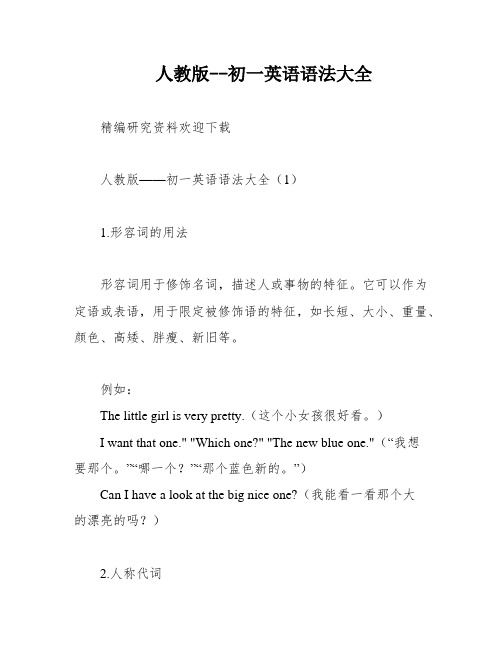
人教版--初一英语语法大全精编研究资料欢迎下载人教版——初一英语语法大全(1)1.形容词的用法形容词用于修饰名词,描述人或事物的特征。
它可以作为定语或表语,用于限定被修饰语的特征,如长短、大小、重量、颜色、高矮、胖瘦、新旧等。
例如:The little girl is very pretty.(这个小女孩很好看。
)I want that one." "Which one?" "The new blue one."(“我想要那个。
”“哪一个?”“那个蓝色新的。
”)Can I have a look at the big nice one?(我能看一看那个大的漂亮的吗?)2.人称代词人称代词用于表示人,分为单数和复数,有主格和宾格之分。
人称代词的主格在句中作主语,宾格则在句中作宾语,通常用于动词或介词的宾语。
例如:He and I are in the same class.(我和他在同一个班级。
)Can you see them in the street?(你能看见他们在街上吗?)3.可数名词和不可数名词英语中的名词分为可数名词和不可数名词。
可数名词可以计数,分为单数和复数两种形式。
它们可以用不定冠词、数词或some、many等修饰。
不可数名词不能计数,没有复数形式,前面不能用不定冠词、数词或many等词语修饰,但可以用some、a little、much等词语来修饰。
有时可以与一些量词短语搭配,这些量词短语中的名词一般是可数的,有单数形式,也可以有复数形式。
例如:可数名词:a man。
a desk。
an apple。
an orange。
some books。
some children。
two pens不可数名词:some water。
a little milk。
much food。
a piece of bread。
two bottles of ink。
七年级英语语法知识总结(精选6篇)
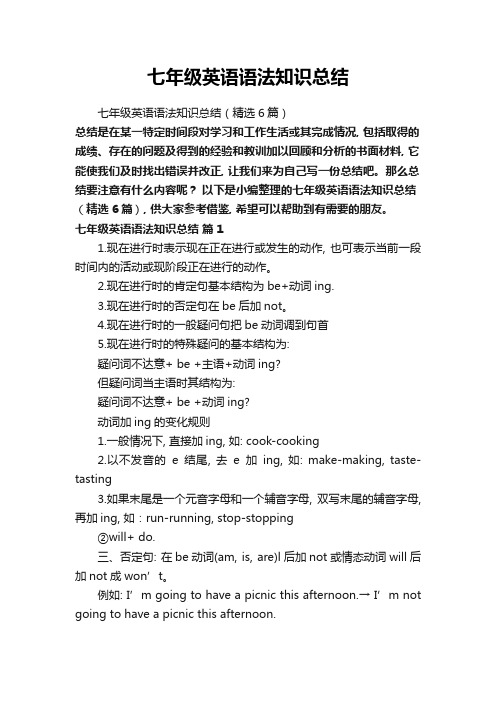
七年级英语语法知识总结七年级英语语法知识总结(精选6篇)总结是在某一特定时间段对学习和工作生活或其完成情况, 包括取得的成绩、存在的问题及得到的经验和教训加以回顾和分析的书面材料, 它能使我们及时找出错误并改正, 让我们来为自己写一份总结吧。
那么总结要注意有什么内容呢?以下是小编整理的七年级英语语法知识总结(精选6篇), 供大家参考借鉴, 希望可以帮助到有需要的朋友。
七年级英语语法知识总结篇11.现在进行时表示现在正在进行或发生的动作, 也可表示当前一段时间内的活动或现阶段正在进行的动作。
2.现在进行时的肯定句基本结构为be+动词ing.3.现在进行时的否定句在be后加not。
4.现在进行时的一般疑问句把be动词调到句首5.现在进行时的特殊疑问的基本结构为:疑问词不达意+ be +主语+动词ing?但疑问词当主语时其结构为:疑问词不达意+ be +动词ing?动词加ing的变化规则1.一般情况下, 直接加ing, 如: cook-cooking2.以不发音的e结尾, 去e加ing, 如: make-making, taste- tasting3.如果末尾是一个元音字母和一个辅音字母, 双写末尾的辅音字母, 再加ing, 如:run-running, stop-stopping②will+ do.三、否定句: 在be动词(am, is, are)l后加not或情态动词will后加not成won’t。
例如: I’m going to have a picnic this afternoon.→ I’m not going to have a picnic this afternoon.四、一般疑问句: be或will提到句首, some改为any, and改为or, 第一二人称互换。
例如: We are going to go on an outing this weekend.→ Are you going to go on an outing this weekend?五、对划线部分提问。
(完整版)新人教版七年级英语语法知识点汇总
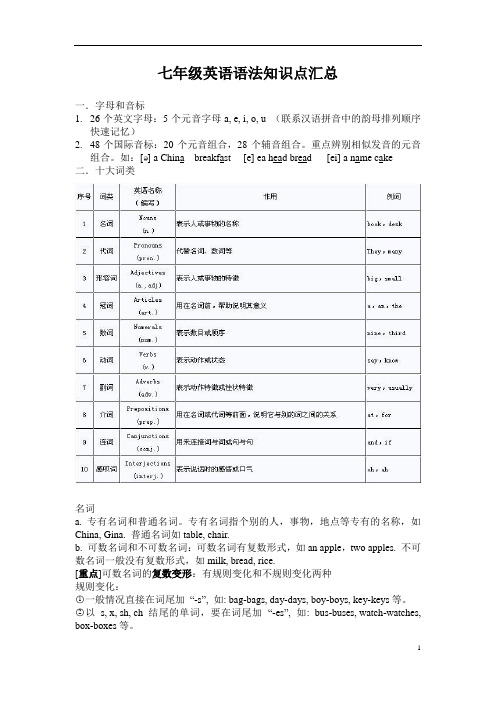
七年级英语语法知识点汇总一.字母和音标1.26个英文字母:5个元音字母a, e, i, o, u (联系汉语拼音中的韵母排列顺序快速记忆)2.48个国际音标:20个元音组合,28个辅音组合。
重点辨别相似发音的元音组合。
如:[ə] a China breakfast [e] ea head bread [ei] a name cake 二.十大词类名词a. 专有名词和普通名词。
专有名词指个别的人,事物,地点等专有的名称,如China, Gina. 普通名词如table, chair.b. 可数名词和不可数名词:可数名词有复数形式,如an apple,two apples. 不可数名词一般没有复数形式,如milk, bread, rice.[重点]可数名词的复数变形:有规则变化和不规则变化两种规则变化:○1一般情况直接在词尾加“-s”, 如: bag-bags, day-days, boy-boys, key-keys等。
○2以s, x, sh, ch结尾的单词,要在词尾加“-es”, 如: bus-buses, watch-watches, box-boxes等。
○3以辅音字母加y结尾的单词,要变y为i再加“-es”, 如:baby-babies, country-countries, family-families等。
○4部分以f (e)结尾的单词,要变f (e)为“ves”, 如:knife-knives, half-halves等。
顺口溜:小偷(thief)的妻子(wife),为了自己(self)保命(life),站到架子上(shelf),用树叶(leaf)做的小刀(knife),将狼(wolf)劈成了两半(half)○5以字母“o”结尾的单词,没有生命的加“-s”,有生命的加“-es”,如:zoo-zoos, photo-photos, tomato-tomatoes.口诀:黑人(Negro)英雄(hero)爱在火山(volcano)吃土豆(potato)西红柿(tomato)不规则变化:○1改变单数名词中的元音字母:man-men, woman-women, foot-feet, tooth-teeth等。
人教版初一英语语法知识点总结归纳
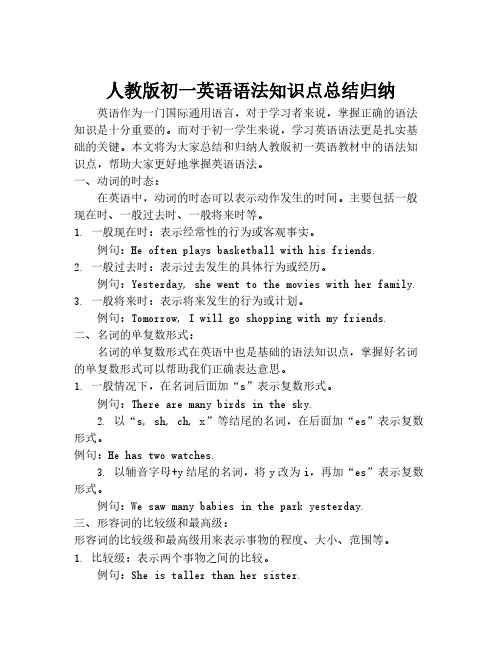
人教版初一英语语法知识点总结归纳英语作为一门国际通用语言,对于学习者来说,掌握正确的语法知识是十分重要的。
而对于初一学生来说,学习英语语法更是扎实基础的关键。
本文将为大家总结和归纳人教版初一英语教材中的语法知识点,帮助大家更好地掌握英语语法。
一、动词的时态:在英语中,动词的时态可以表示动作发生的时间。
主要包括一般现在时、一般过去时、一般将来时等。
1. 一般现在时:表示经常性的行为或客观事实。
例句:He often plays basketball with his friends.2. 一般过去时:表示过去发生的具体行为或经历。
例句:Yesterday, she went to the movies with her family.3. 一般将来时:表示将来发生的行为或计划。
例句:Tomorrow, I will go shopping with my friends.二、名词的单复数形式:名词的单复数形式在英语中也是基础的语法知识点,掌握好名词的单复数形式可以帮助我们正确表达意思。
1. 一般情况下,在名词后面加“s”表示复数形式。
例句:There are many birds in the sky.2. 以“s, sh, ch, x”等结尾的名词,在后面加“es”表示复数形式。
例句:He has two watches.3. 以辅音字母+y结尾的名词,将y改为i,再加“es”表示复数形式。
例句:We saw many babies in the park yesterday.三、形容词的比较级和最高级:形容词的比较级和最高级用来表示事物的程度、大小、范围等。
1. 比较级:表示两个事物之间的比较。
例句:She is taller than her sister.2. 最高级:表示三者或三者以上事物之间的最高程度。
例句:This is the most interesting book I have ever read.四、副词的用法:副词用来修饰动词、形容词、副词等,表示时间、地点、程度、方式等概念。
人教新目标七年级英语上册全册语法知识汇总
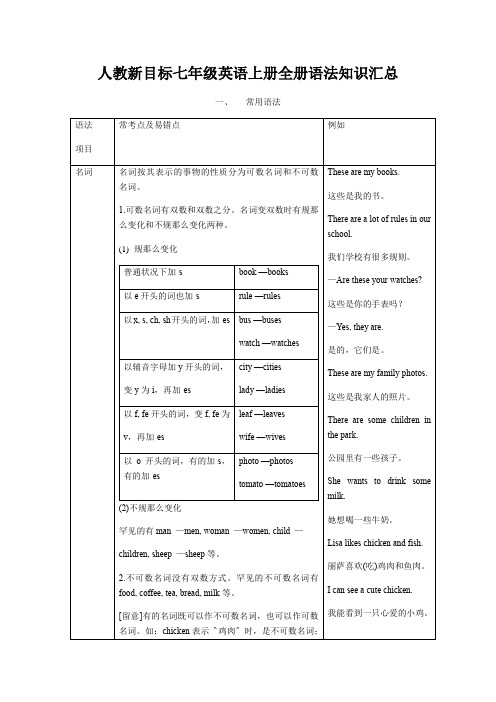
人教新目标七年级英语上册全册语法知识汇总一、常用语法二、必考词汇归类1. 言语类词汇Chinese 汉语English 英语French 法语Japanese 日语Korean 韩语German 德语2. 颜色类词汇red 白色white 白色black 黑色blue 蓝色yellow 黄色green 绿色purple 紫色brown 棕色;褐色3. name的相关拓展last name 姓氏family name 姓氏f irst name 名字given name 名字full name 全名middle name 中间名4. 〝好〞的罕见单词fine 描画词,多指〝身体安康〞或〝天气阴沉〞。
good 描画词,多指人品好或产品的质量好。
well 描画词,表示〝身体安康的〞;副词,表示〝好(用于修饰动词)〞。
nice 描画词,着重强调人的觉得,表示〝美妙的;美味的;美丽的〞。
5. 家庭称谓grandfather (外)祖父;爷爷;外公;姥爷grandmother (外)祖母;奶奶;外婆;姥姥grandparent 祖父(母);外祖父(母)father 父亲;爸爸mother 母亲;妈妈uncle 舅父;叔父;伯父;姑父;姨父aunt 姑母;姨母;伯母;婶母;舅母sister 姐;妹brother 兄;弟cousin 堂兄(弟、姊、妹);表兄(弟、姊、妹) son 儿子daughter 女儿6. 学习用品pencil 铅笔book 书dictionary 词典;字典eraser 橡皮schoolbag 书包pencil box 铅笔盒;文具盒7. help短语help sb. to do sth. 协助某人做某事help sb. do sth. 协助某人做某事help sb. with sth. 协助某人做某事with one’s help 在某人的协助下with the help of... 在……的协助下8. 频度副词always 不时;总是often 经常usually 通常sometimes 有时hardly/seldom 简直不never 从不9. go+动名词go skiing 去滑雪go hunting 去打猎go climbing 去爬山go swimming 去游泳go skating 去滑冰go fishing 去钓鱼10. play的罕见短语play tennis 打网球play basketball 打篮球play volleyball 打排球play baseball 打棒球play soccer/football 踢足球play chess 下国际象棋play the piano 弹钢琴play the violin 拉小提琴play the guitar 弹吉他play sports 做运动play cards 打牌play computer games 玩电脑游戏play games 玩游戏11. difficult的联想hard 难的easy 复杂的simple 复杂的diff iculty 困难12.〝看〞的辨析watch 强调观看运动着的事物。
2024人教版七年级英语
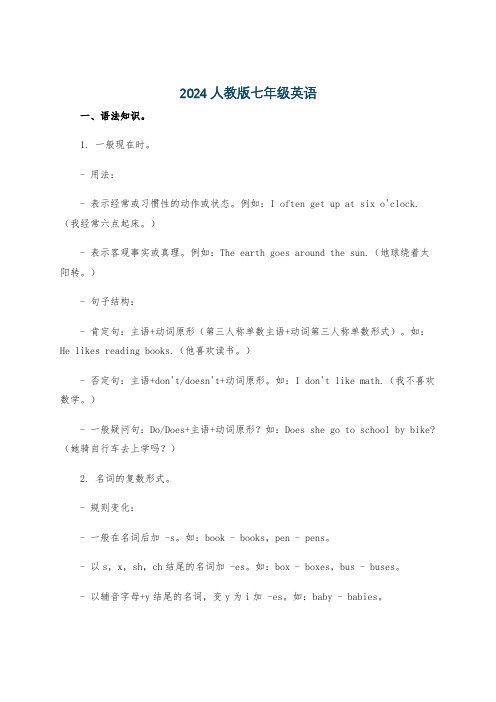
2024人教版七年级英语一、语法知识。
1. 一般现在时。
- 用法:- 表示经常或习惯性的动作或状态。
例如:I often get up at six o'clock.(我经常六点起床。
)- 表示客观事实或真理。
例如:The earth goes around the sun.(地球绕着太阳转。
)- 句子结构:- 肯定句:主语+动词原形(第三人称单数主语+动词第三人称单数形式)。
如:He likes reading books.(他喜欢读书。
)- 否定句:主语+don't/doesn't+动词原形。
如:I don't like math.(我不喜欢数学。
)- 一般疑问句:Do/Does+主语+动词原形?如:Does she go to school by bike?(她骑自行车去上学吗?)2. 名词的复数形式。
- 规则变化:- 一般在名词后加 -s。
如:book - books,pen - pens。
- 以s,x,sh,ch结尾的名词加 -es。
如:box - boxes,bus - buses。
- 以辅音字母+y结尾的名词,变y为i加 -es。
如:baby - babies。
- 以o结尾的名词,有生命的加 -es(如:potato - potatoes,tomato - tomatoes),无生命的加 -s(如:photo - photos)。
- 不规则变化:- 例如:man - men,woman - women,child - children,foot - feet,tooth - teeth等。
3. 形容词性物主代词。
- 包括:my(我的),your(你的/你们的),his(他的),her(她的),its (它的),our(我们的),their(他们的)。
- 用法:用来修饰名词,表示所属关系。
例如:This is my book.(这是我的书。
)二、词汇积累。
(完整版)最全的人教版七年级英语语法总结
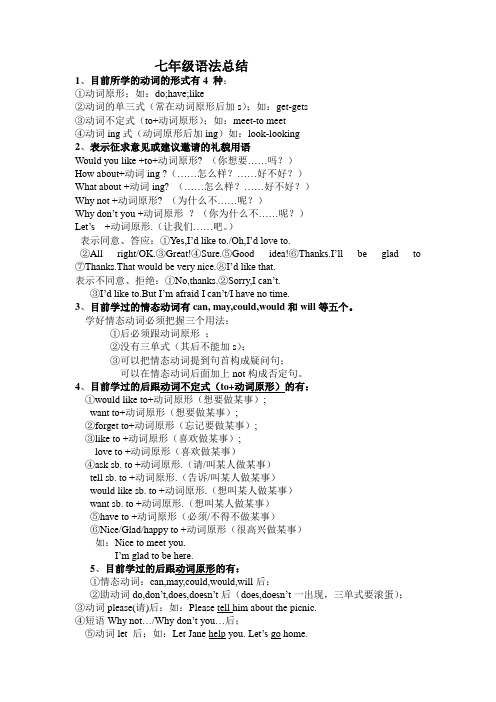
yuan---yuan(人民币元)
4) mouse—mice (老鼠) child—children(儿童)
5)合成词中一般变后面的词:apple tree---apple trees(苹果树)
但下列需前后都变:man teacher---men teachers(男教师)
woman doctor---women doctors(女医生)
7、有单复数变化的词
①名词
(1) 名词单数变复数的方法
1)大部分在词尾加 s.如:dog---dogs
2)以-s, -x, -ch, -sh 结尾的加 es. 如:
class---classes bus---buses glass---glasses
box---boxes watch---watches(手表)
How about +动词 ing? —How about g.o..in.g.fishing this Sunday?
It’s time for g.o..in.g.home=It’s time to go home.
Thank you for h.e..lp..in.g.me=Thank you for your help.. ③go +动词 ing——go fishing 去钓鱼; go shopping 去购物 ④do some shopping 购物 ⑤like/love +动词 ing (喜欢做某事)
⑥动词 help 后,也可带 to;如:Let’s help Maria (to) carry water. ⑦祈使句以动词原形开头,如:Have a seat , please.请坐下。 6、目前学过的后跟动词 ing 的有: ①Be 动词后的动词;如:Are you k..id.d..in.g.? I’m just .lo.o.k..in.g..
人教版七年级英语语法知识总结

英语七年级语法知识总结1.动词be(is,am,are)的用法我(I)用am, 你(you)用are,is跟着他(he),她(she),它(it)。
单数名词用is,复数名词全用are。
变否定,更容易,be后not加上去。
变疑问,往前提,句末问号莫丢弃。
还有一条须注意,句首大写莫忘记。
2.this,that和it用法(1)this和that是指示代词,it是人称代词。
(2)距离说话人近的人或物用this, 距离说话人远的人或物用that。
如:This is a flower. 这是一朵花。
(近处)That is a tree. 那是一棵树。
(远处)(3)放在一起的两样东西,先说this, 后说that。
如:This is a pen. That is a pencil. 这是一支钢笔。
那是一支铅笔。
(4)向别人介绍某人时说This is…, 不说That is…。
如:This is Helen. Helen, this is Tom. 这是海伦,海伦,这是汤姆。
(5)This is 不能缩写, 而That is可以缩写。
如:This is a bike. That’s a car. 这是一辆自行车。
那是一辆轿车。
(6)打电话时,介绍自己用this, 询问对方用that。
如:—Hello! Is that Miss Green? 喂,是格林小姐吗?—Yes, this is. Who’s that? 是的,我是,你是谁?注意:虽然汉语中使用―我‖和―你‖,但英语中打电话时绝不可以说:I am…, Are you…?/Who are you?(7)在回答this或that作主语的疑问句时, 要用it代替this或that。
如:①—Is this a notebook? 这是笔记本吗?—Yes, it is. 是的,它是。
②—What’s that? 那是什么?—It’s a kite. 是只风筝。
3.these和those用法this, that, these和those是指示代词,these是this的复数形式,指时间,距离较近的或下面要提到的人或事;those是that的复数形式,指时间、距离较远或前面已经提到过的人或事物。
人教版七年级英语语法归纳总结

人教版七年级英语语法归纳总结特殊疑问句①问年龄 How old is Lucy? She is twelve.②问种类What kind of movies do you like? I like action movies and comedies.③问身体状况 How is your uncle? He is well/fine.④问方式 How do/can you spell it? L-double O-K.How do we contact you? My e-mail address is ******************.⑤问原因Why do you want to join the club?⑥问时间What’s the time? (=What time is it?) It’s a quarter to ten a.m..What time do you usually get up, Rick? At f ive o’clock.When do you want to go? Let’s go at 7:00.⑦问地方Where’s my backpack? It’s under the table.⑧问颜色 What color are they? They are light blue.What’s your favourite color? It’s black.初中英语时态1、一般现在时表示普遍、经常性的或长期性的动作时使用一般现在时,它有:Be 动词:She’s a worker. Is she a worker? She isn’t a worker.情态动词:I can play the piano. Can you play the piano? I can’t play the piano.行为动词:They want to eat some tomatoes. Do they want to eat any tomatoes? They don’t want to eat any tomatoes.Gina has a nice watch. Does Gina have a nice watch? Gina doesn’t have a watch.2、现在进行时表示动词在此时正在发生或进行就使用进行时态,结构为sb be v-ing sth + 其它.I’m playing baseball. Are you playing baseball? I’m not playing baseball.Nancy is writing a letter. Is Nancy writing a letter? Nancy isn’t writing a letter.They’re listening to the pop music. Are they listening the pop music? They aren’t listening to the pop music.七年级英语重点短语1 .be from = come from 来自于----2. live in 居住在---3. on weekends 在周末4 .write to sb = write a letter to sb 给某人写信;写信给某人5 .in the world 在世界上 in China 在中国6.pen pal 笔友 14 years old 14岁 favorite subject 最喜欢的科目7.the United States 美国 the United Kingdom 英国 New York 纽约8.speak English 讲英语 like and dislike 爱憎9.go to the movies 去看电影 play sports 做运动。
(完整版)人教版初中英语语法完整总结
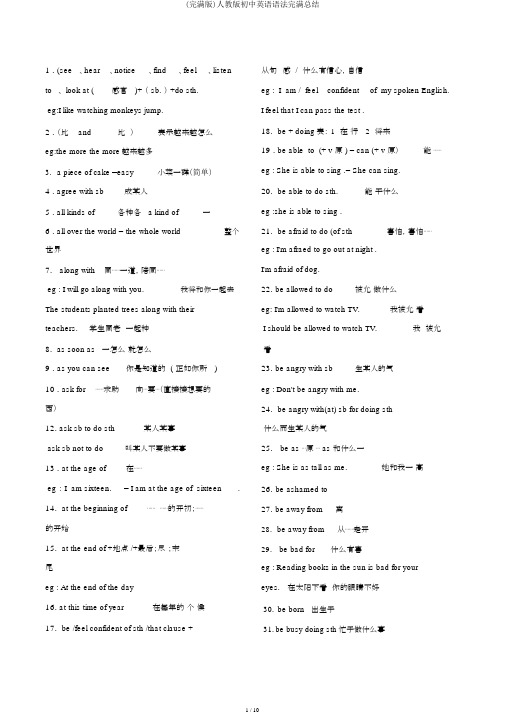
1 . (see、hear、notice、find、feel、listen to、look at (感官)+(sb.)+do sth.eg:I like watching monkeys jump.2. (比and比)表示越来越怎么eg:the more the more越来越多3. a piece of cake =easy小菜一碟(简单)4. agree with sb成某人5. all kinds of各种各 a kind of一6. all over the world = the whole world整个世界7.along with 同⋯⋯一道,陪同⋯⋯eg : I will go along with you.我将和你一起去The students planted trees along with theirteachers.学生同老一起种8.as soon as 一怎么就怎么9 . as you can see你是知道的(正如你所)10 . ask for⋯⋯求助向⋯要⋯(直接接想要的西)12. ask sb to do sth某人某事ask sb not to do叫某人不要做某事13 . at the age of在⋯⋯eg : I am sixteen. = I am at the age of sixteen.14. at the beginning of⋯⋯⋯⋯的开初;⋯⋯的开始15.at the end of +地点/+最后;尽;末尾eg : At the end of the day16. at this time of year在每年的个候17.be /feel confident of sth /that clause +从句感/什么有信心,自信eg : I am / feel confident of my spoken English.I feel that I can pass the test .18.be + doing表:1在行2将来19 . be able to (+ v原) = can (+ v原)能⋯⋯eg : She is able to sing .= She can sing.20.be able to do sth.能干什么eg :she is able to sing .21.be afraid to do (of sth害怕,害怕⋯⋯eg : I'm afraed to go out at night .I'm afraid of dog.22. be allowed to do被允做什么eg: I'm allowed to watch TV.我被允看I should be allowed to watch TV.我被允看23. be angry with sb生某人的气eg : Don't be angry with me.24.be angry with(at) sb for doing sth什么而生某人的气25.be as ⋯原⋯ as 和什么一eg : She is as tall as me.她和我一高26.be ashamed to27. be away from离28.be away from从⋯⋯走开29.be bad for什么有害eg : Reading books in the sun is bad for youreyes.在太阳下看你的眼睛不好30.be born 出生于31.be busy doing sth忙于做什么事be busy with sth忙于⋯⋯32.be careful小心;小心33. be different from⋯⋯和什么不一34.be famous for以⋯⋯出名35.be friendly to sb某人友好36.be from = come from来自eg : He is from Bejing.He comes from Bejing.Is he from Bejing? Does he come from Bejing ?37.be full of装⋯⋯的be filled with充eg: The glass is full of water.The glass is filled with water.38.be glad+to+do/从句39.be going to + v(原)将来40.be good at(+doing) = do well in在某方面善 ,善于⋯⋯41. be good for什么有好eg : Reading aloud is good for your English.42.be happy to do很高做某事43.be helpful to sb某人有好eg : Reading aloud is helpful to you.大声朗你有好Exercising is helpful to your body.你的身体有好44.be in good health身体健康45.be in trouble于困中eg : She is in trouble. They are in tronble.46. be interested in某方面感趣eg: Be late for class上到48.be like像⋯⋯ eg : I'm like my mother.49.be mad at生某人的气50.be made from 由⋯⋯制成 ( 制成今后看不原资料 )51.be made of 由⋯⋯制成 ( 制成今后看得原资料 )52.be not sure表不确定53.be on a visit to参54.be popular with sb受某人迎55.be quiet沉寂56.be short for···的写eg:陶 is short for陶好汉57.be sick in bed生病在床58.be sorry to do sth be sorry for sbeg : I am sorry for you.59.be sorry to hear that60.be sorry to trouble sbeg : I am sorry to trouble you .61. be strict in doing sth于做某事eg : He's strict in obeying rules .62. be strict with sb某人要求格eg: Some students are not strict withthemselves.些学生自己不格63. be strict with sb in sth某方面某人格64. be supposed to do被要求干什么65. be sure表确定66. be sure of doing sth做某事有信心47. be late for = come late to到eg: He is sure of winning. I am sure of learning English well.67. be sure of sth做某事有信心eg: I'm sure of my head. (my teacher我相信我的大(老)68. be sure that sth做某事有信心eg: I'm suer that he can pass the test.我相信他能通考69. be sure to do sth必然会做某事eg: We are sure to pass the test.我必然会通次考We are sure to learn English well.我必然能学好英I begin to go home78.between⋯and⋯两者之79. borrow sth from sb向⋯⋯借⋯⋯lend sth to sb ( lend sb sth借⋯⋯什么西eg : I borrowed a pen from him he lent a pen to me. ( He lent me a pen. )80.both = the same(as) = not different(from)表相同81.bother 打 bother sb to do stheg : I'm sorry to bother you ,but can you tellme to way to the station .我十分道歉打你,但是你能告我怎么去站70.be terrified of +名 / doing 害怕⋯⋯The problem has been bothering me for weeks.71. be terrified to do sth害怕做某事个困了我几个周了72.be the same as⋯和什么一He's bothering me to lend him money .73.be used to doing sth做某事82.by the end of到⋯⋯止eg: My father is used to getting up early.我83. call sb sth eg : We call him old wang.爸爸早 He is used to sleeping in class.他84.care关心上睡eg : Don't you care about this country's future ?74.be worth doing- 得做什么你什么不关心国家的将来75.be(feel) afraid to do sth害怕做某事85.catch up with sb追上某人be afraid of sth害怕某物86. chat with sb和某人be afraid that句e in76.because+ 句子 because of + 短88. come over to来eg : He was late because he had a e up with提出He was late because of his headache .eg: Can you come up with a good idea?你能想77.begin to do = start to do开始做某事出一个好法?start ⋯with ⋯=begin ⋯with ⋯以什么开始什么municate with sb和某人交流eg : Let's begin the game with the song.91.consider + doing考做什么eg : Why not consider going to lu zhou.什么不考去州?92.dance to 随着⋯⋯跳舞eg : She likes dancing to the music .她喜随着音跳舞93. decide to do sth决定做某事94. do a survey of做某方面的95.do better in在⋯⋯方面做得更好96.do wrong 做97.Don't forget to do sth不要忘了做某事98.Don't mind +doing / 从句 / 名不要介意⋯⋯99.each + 名()每一个⋯eg : Each student has many books.每一个学生都有一些100.end up +doing101.enjoy +doing喜102.escape from从⋯⋯逃跑eg: The prisoners have escaped from the prison.犯人从里逃跑出来103.expect to do sth希望做某事104.fall down摔下来 fall off从哪摔下来105.fall in love with sb /sth上什么106.far from离某地eg : The school is far from my home.107. find +it +adj. +to do做某事怎么108.find sb/sth +adj.什么怎么eg : I find the book interesting.109. finish完成+doing(名)111. forget to do 没有做而忘了forget doing做了而又忘了eg: Don't forget to go home, I forget closingdoor .112.from ⋯to ⋯从某某到某某eg: From me to her113.get /have sth down做完,被(人)做⋯eg: I have my hair cut.我理了(被剪了)Tom got his bad tooth pulled out.母把他的坏牙拔掉了(被牙医拔掉了)114. get a part-time job= find a part-time job115.get along well with sb = get on wellwith sb 与某人相得好116. get along with sb = get on with sb与某人相117. get ready for = be ready for什么而准eg : I get ready for math exam.I am ready for math exam.118. get sb in to trouble某人制造麻,使某人坠入麻119.get sb to do sth120.get ⋯from ⋯从某获取某物121. give a talk做告eg:He is give a talk. 122.give sth. to sb.= give sb. sth.某人某物123.go fishgo swimming游泳124.go on to do去做下一件事go on doing做件事110. fit to sb = be fit for sb适合某人125.go out away from =go out of143.How about(+doing) = What about(+doing)126.go to school上学(用于的)go to the144.how do you like = what do you think of你school 去学校(不用然是上学)什么的看法127.good way to好方法145.if :可否= wether128.hate to do没做的事eg: I don't know if(wether) I should go to the hate doing做的事party .我不知道我可否去参加晚会129.have a party for sb的晚会He don't know if(wether) we will arrive on time 130.have a talk听告一tomorrow morning .他不知道我明天清早可否能131.have been doing在完成行准到达eg : You have been talking You have been146.if: 若是,若是(全部接一般)+条件sleeping since.从句132.have been to ⋯( 地方)⋯⋯去某地方eg: I'll go to LuZhou if it does't rain.若是have gone to⋯(地方)去了某地没回来明天不下雨,我就去州133.have fun +doing玩得高If they change the plan they will let me know.134. have sth to do有什么事要做若是他要改划,他会我知道的eg: I have a lot of homework to do.我有很多I'll go to England,if I have enough money next 家庭作要做year .若是我明年由足的,我就要去英国I have nothing to do.我没什么事情做147.in one's opinion = sb think某人135.have to do sth必做某事148.in some ways在某些方面136.have trouble (problem) (in) doing sth做149.in the end = finally(adv)最后什么事情有麻150.in the north of⋯什么在什么的北方137.have⋯time +doing( north北 sowth南 west 西 east)138.have⋯() ⋯off放⋯⋯假151.in the sun在太阳下eg: I have month off我一个月得假152.increase增加139.hear sb +do/doing听某人做某事/正在做eg : They've increased the piece of petrol by某事3% . 他把石油价增加了 3%140.help a lot很大用The population has increased from12 million141.help sb with sth \one's sth帮助某人某事ten years agoto 18 million now .(某方面) help sb (to) do sth帮助某人做某事153. instead of +(名)代替142. hope to do sth希望做某事eg: I'd like an apple instead of a pear.我想要苹果,而不要梨子I like English instead of math.我喜英而不喜数学154.introduce sb to sb介某人某人introduce oneself自我介155.invite sb to do sth邀某人做某事156.It takes sb sometime to do sth做某人花掉某人多少eg : It took me 5 minutes to do my homework .It takes me half an hour to cook.157. It's +adj +for sb to do sth某人来做某事怎么158.It's +adj +to do做某事怎么159.It's +adj for sb于某人来怎么It's +adj of sb某人来太怎么160.It's +adj(for sb) to do(某人来)做某事怎么It's +adj of sb to do sth某人来做某事太怎么eg : It's nice of you to help me with my English. 161. It's a good idea for sb to do sth⋯⋯来是个好想法162. It's important to sb某人来很重要eg: It's important to me.163.It's time to do sth = It's time for sth到了去做某事的eg : It's time to have class It's time for class.去上了164. join = take part in参加166. keep +sb /sth +adj /介短什么保持什么?167.keep out 不⋯⋯入168.keep sb adj⋯⋯保持⋯⋯eg: I want to keep my mother happy/ keep healthy.保持高 / 健康169.key to + 名表示:某物的匙或某的答案170.key to ⋯ key 能够是答或匙anser to⋯ugh at ⋯耻笑⋯⋯eg : Don't langh at others.We langhed at the joke.172.learn by oneslfe自学173.learn from sb向某人学eg: We should learn from Lei Feng.174.learn to do sth学做某事175.let sb do sth某人做某事176.Let sb down某人无望eg : We shouldn't let our farents down.我不我的父亲母亲无望177.live from :离某地178.live in + 大地方 /at + 小地方居住在某地eg: I live in LuZhou.She lives at XuanTan .179.look after = take care of照照看180.lose one's way迷路eg : Lose your way.你迷路了181.make a decision to do sth决定做某事182.make friends with sb和成朋友165. just now才eg : I want to make friends with you.183.make it early把定的早一点184.make on exhibition of oneself某人出洋相185.make sb /n +n使什么成什么eg : I made you my wife.186.make sb /sth +adj使某人(某物)怎么eg : You must made your bed clean.187.make sb /sth adj使某人 / 某物怎么188.make sb do sth某人做某事eg : I made him write.我以前他写189.make up be made up of (被)由⋯⋯成190.make⋯difference to ⋯191.mind sb to do mind one's doing介意⋯⋯做什么192. most +名most of +代193.much too + 形容194.must be 必然195.need + 名196.need sb do sth需要某人做某事197.need to do ( ) need do ( 情)198. no /neithr of hate to do no /neithr of hate doing199.no + 名200. not anymore = no more不再⋯⋯eg: He didn't cry any more He cried no more.他不再哭201. not⋯(形、副)at all eg: He's not tall at all she doesn't junp farat all .202.not ⋯at all一点都不203.not ⋯either表否定,也不eg : I don't have sister, either.我也没有姐姐204.not ⋯until 直到⋯⋯才⋯⋯eg: I didn't sleep until my mother came back.The child didn't stop crying until I give hersugar.205.offer / provide sb with sth某人供应206.offer sb sth ( offer sth to sb供应什么西某人eg : I offer you water .(I offer water to you . )我你供应水207.on one's way to ⋯在去那的路上208.on the one hand一方面on the other hand另一方面209.on the phone = over the phone用交210.on time 准 in time及211.one day = some day = someday 一天,有一天212.one of + 可数名的复数形式213.one to another一个到另一个214.over and over agin一遍又一遍的eg : He cleaned the floor over and over agin .215.part-time job兼工作 fall-time job全工作216.pay for ⋯付⋯⋯pay the bill开,付217.please +do218.please help yourself219.pleased with sb220.pool into = pore into221.practice +doing做某事222.prefer sth to sth相⋯⋯更喜⋯⋯eg : I prefer physics to chemisty.在物理和化学中,我更喜物理prefer doing to sth更喜去做⋯不愿意去做⋯eg: He prefers riding a bike to diving.他更喜自行,不开小prefer to do sth rather than do sth宁愿做⋯也不愿eg: My unde prefers to buy a now car rather than repaiv the used one.我叔叔更喜新的,也不去修旧prefer sb not to do sth更愿意⋯eg: I prefer her not to come我不喜她不来223. pretend to do sth装着去做什么pretend that从句eg : The two cheats pretended to be working very hard .两个子装着努力工作He pretended that he did not know the answer .他装着不知道答案224 . rather⋯than宁愿⋯⋯也不⋯⋯eg : I would rather be a doctor than a teacher.我愿肯当医生,也不当老He likes dogs rather than cats.他喜狗,不喜猫eg: Please give my best regards to your family.我向你的家人我最好的候I regard you as my friend.我把你看作我的朋友He shows little regard for others.他不关心人226. remid sb about sth提示某人什么事remid sb to do sth提示某人做某事eg : he remids me about cooking (He remids meto cook.他提示我做227. remid sb of sth使某人想起什么eg : The pictures remind me of my school days.照片使我想起了我的学校T he wor ds that (which) the teacher talke toremind me of my mother.228.return sth to sb什么西某人229.say to oneself自己230.say to sb某人231.sb spend somemoney on sth花了多少在某事上232.sb spend sometime with sb花了多少陪233.sb spend sometime(in) doing sth花了多少做某事234.sb with sb +is sb and sb +are235.see sb do 看某人做某事see sb doing看某人正在做某事236.seem to do/be +adj得怎么eg :You seem to be tired.You seem to be happy. 237.send +sb sth送某人某物225.regard ⋯as 把⋯⋯看作⋯⋯238.send⋯to ⋯把什么寄到哪里去?239.shock 使⋯⋯震惊eg : Oh , It's only you ! You give me a shock .啊,是你呀!吓我一跳240.show sb sth 向某人显现某物eg : I show her the book.241. show sb sth = show sth to sb拿什么西某人看eg: Show me your pen.= Show your pen to me. 242.show sth to sb向某人显现某物eg : I show the book to her.243.some⋯others ⋯一些⋯⋯另一些⋯⋯244.start ⋯with ⋯从⋯⋯开始begin ⋯with ⋯从⋯⋯开始245. stay away from离⋯⋯eg : We're told to stay away from the animalswhe visiting the zoo.当我参zoo ,我要离物If you want to lose weight you'd better stayauay from the sweet food.若是你想减肥,你最好离甜食246.stop doing停下正在做的事247.stop sb from doing sth阻拦某人做某事248.stop sb(from) doing阻拦某人做某事249.stop to do停下正在做的事去做下一件事250.such + 名,种251.suit sb 适合某人252.surprise sb使某人惊诧to one's surprise令某人惊诧253.take classes上254.take sb to把某人去eg : I take you to the hospital.255.take walks = take a walk=go for a walk闲步256.① talk to eg : I talk to you .② talk with和 eg : I talk with him .③ talk of到 eg : we talked of you.④ talk about关于⋯⋯257.talk with sb和某人258.teach sb sth教某人做某事259.tell sb do sth告某人做某事260.tell sb sth tell sb that句 tell sb not to do sth tell a story261.tell sb sth告某人某事262.tell sb to do sth告某人做什么tell sb not to do sth告某人不要做什么263.tell ⋯from ⋯264.thank you for +doing265.the same + 名 (doing)+as ⋯⋯266.the same ⋯( 名) ⋯asas⋯(adj adv)⋯as相同267.the way to do sth=the way of doing sth做某方面的方法 the way to +地方去哪的路e g :Do you know the way to learn English.Do you know the way of learning English.268.the way to ⋯(地点)到哪的269.too ⋯to ⋯太怎而不能够⋯⋯ adj +enough to足⋯能⋯so⋯that+丛句eg: He is too young to go to school.=He is so young that he can't go to schoolHe is old enough to go to school .=He is so old that he can go to school .270.transalte ⋯⋯ into ⋯⋯把什么翻成什么eg : Trasalte English into chinese .271.travel with sb和某人去旅游272.try one's best to do sth尽某人最大的努力去做某事eg: I will try my best to learn English well.273.try to do sth想干什么,但没成功try doing sth想干什么,已做了eg : He tried to climb.他想爬上去(但没成功) He tried climbing.他想爬上去(已做了)274.try ⋯衣服 have a try一下275.turn down开小←→ turn up开大276.turn off关上←→ turn o n 打开 open拆开277.upside down 倒着278.visit to ⋯参某个地方279. wait for sb等某人。
最全的人教版七年级英语语法总结

7、 有单复数变化的词 ①名词
(1) 名词单数变复数的方法 1)大部分在词尾加 s、如 :dog---dogs 2)以 -s, -x, -ch, -sh 结尾的加 es、 如 :
class---classes bus---buses glass---glasses
box---boxes watch---watches( 手表 )
yuan---yuan( 人民币元 ) 4) mouse— mice ( 老鼠 ) child —children( 儿童 )
5)合成词中一般变后面的词 :apple tree---apple trees(苹果树 ) 但下列需前后都变 :man teacher---men teachers(男教师 )
4、目前学过的后跟动词不定式 (to+动词原形 )的有 : ①would like to+ 动词原形 (想要做某事 ); want to+动词原形 (想要做某事 ); ②forget to+动词原形 (忘记要做某事 ); ③like to +动词原形 (喜欢做某事 ); love to +动词原形 (喜欢做某事 ) ④ask sb、 to +动词原形、 (请 /叫某人做某事 ) tell sb、 to +动词原形、 (告诉 /叫某人做某事 ) would like sb、 to +动词原形、 (想叫某人做某事 ) want sb、 to +动词原形、 (想叫某人做某事 ) ⑤ have to +动词原形 (必须 /不得不做某事 ) ⑥ Nice/Glad/happy to +动词原形 (很高兴做某事 ) 如:Nice to meet you、 I ’ m glad to be he、re 5、目前学过的后跟动词原形的有 : ①情态动词 :can,may,could,would,will 后; ②助动词 do,don ’t,does,doesn后 (’dotes,doesn ’一t出现 ,三单式要滚蛋 );
人教版七年级英语语法点

人教版七年级英语语法点一、名词。
1. 可数名词与不可数名词。
- 可数名词有单复数形式。
复数形式的构成规则如下:- 一般情况加 -s,如book - books,pen - pens。
- 以s,x,ch,sh结尾的加 -es,如bus - buses,box - boxes,watch - watches,brush - brushes。
- 以辅音字母+y结尾的,变y为i再加 -es,如baby - babies。
- 以o结尾的,有生命的加 -es(如tomato - tomatoes,potato - potatoes),无生命的加 -s(如photo - photos,piano - pianos)。
- 以f或fe结尾的,变f或fe为v再加 -es,如knife - knives,leaf - leaves。
- 不可数名词没有复数形式,如water,milk,bread等。
表示数量时,要用“数词+量词+of+不可数名词”,如a glass of water,two cups of tea。
2. 名词所有格。
- 有生命的名词所有格:- 一般在名词后加's,如Tom's book。
- 以s结尾的复数名词,只加',如the students' classroom。
- 表示两者或多者共有时,只在最后一个名词后加's;表示各自拥有时,每个名词后都要加's。
例如:Tom and Jerry's room(他们共有的房间);Tom's and Jerry's rooms(他们各自的房间)。
- 无生命的名词所有格常用“of+名词”结构,如the window of the room。
二、代词。
1. 人称代词。
- 主格:I,you,he,she,it,we,you,they,在句中作主语。
例如:I am a student. He likes reading.- 宾格:me,you,him,her,it,us,you,them,在句中作宾语。
新人教版七年级上册英语语法、短语和知识点总结
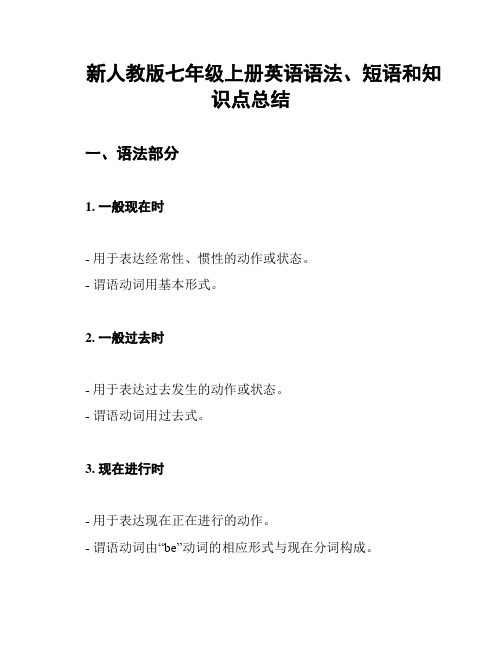
新人教版七年级上册英语语法、短语和知
识点总结
一、语法部分
1. 一般现在时
- 用于表达经常性、惯性的动作或状态。
- 谓语动词用基本形式。
2. 一般过去时
- 用于表达过去发生的动作或状态。
- 谓语动词用过去式。
3. 现在进行时
- 用于表达现在正在进行的动作。
- 谓语动词由“be”动词的相应形式与现在分词构成。
4. 动词不定式
- 作为名词、形容词或副词的补足语。
- 用于表达目的、原因、结果等。
二、短语部分
1. in front of
- 在...前面
2. on the right/left
- 在右边/左边
3. at the back of
- 在...后面
4. go straight
- 直走
三、知识点部分
1. 单复数
- 名词的复数形式变化规则。
2. 冠词
- a/an 用于泛指单数可数名词前。
- the 用于特指名词前。
3. 人称代词
- I, you, he, she, it, we, they。
4. 并列连词
- and, but, or 用于连接并列的词、短语或句子。
四、总结
本文档总结了新人教版七年级上册英语课程中的语法、短语和
知识点。
内容包括一般现在时、一般过去时、现在进行时等语法部分,以及一些常用短语和知识点。
希望对研究者有所帮助。
以上是对新人教版七年级上册英语语法、短语和知识点的总结。
注意:
本文档中的内容仅供参考。
七年级英语语法知识点人教

七年级英语语法知识点人教Part 1 词汇基础1. 名词:代表人、事物、地点、抽象概念等。
2. 代词:代替特定的人、事物、抽象概念等。
3. 形容词:修饰名词或代词,表示特征、性质等。
4. 副词:修饰动词、形容词、其他副词等,表示时间、方式、程度、原因等。
5. 动词:表示行为或状态的词。
6. 介词:连接名词或代词与其他词汇,表示空间、时间、关系等。
7. 连词:连接词语、短语、句子等,让它们在语法上产生关联。
8. 冠词:用于限定名词。
Part 2 句型1. 简单句:只包含一个主语和一个谓语的句子。
2. 复合句:包含一个主句和一个或多个从句的句子。
3. 并列句:两个或更多简单句并列而成,用连词连接。
4. 疑问句:用于提问,以动词第一次出现作为句子的开头。
5. 肯定句和否定句:肯定句表示一个肯定的事实,否定句表示某事不是真的。
Part 3 时态1. 一般现在时:表示通常或经常发生的事件。
2. 现在进行时:表示现在正在进行的事件。
3. 一般过去时:表示过去发生的事情。
4. 过去进行时:表示过去某个时间正在进行的事件。
5. 将来时:表示将要发生的事件。
Part 4 语态1. 主动语态:表示主语是动作的执行者。
2. 被动语态:表示主语是动作的承受者,动作的执行者不一定提及。
Part 5 常见句型1. There be句型:表示某处有某事或某人。
2. have/has+过去分词:表示已经发生的动作对现在有影响。
3. be going to:表示未来打算或计划做某事。
4. should/shouldn't:表示应该或不应该做某事。
5. can/can't:表示能够或不能够做某事。
6. must/mustn't:表示必须或禁止做某事。
Part 6 语法注意事项1. 名词复数形式的构成规则。
2. 形容词的比较级和最高级形式。
3. 副词和形容词的用法区别。
4. 代词和名词的不同用法。
5. 定冠词和不定冠词在句中的用法。
- 1、下载文档前请自行甄别文档内容的完整性,平台不提供额外的编辑、内容补充、找答案等附加服务。
- 2、"仅部分预览"的文档,不可在线预览部分如存在完整性等问题,可反馈申请退款(可完整预览的文档不适用该条件!)。
- 3、如文档侵犯您的权益,请联系客服反馈,我们会尽快为您处理(人工客服工作时间:9:00-18:30)。
人教版七年级英语语法总结HEN system office room 【HEN16H-HENS2AHENS8Q8-HENH1688】七年级英语语法----时态(一般现在时现在进行时一般过去时)学习手册在七年级英语学习中我们主要学习了3种时态,即一般现在时现在进行时一般过去时。
今天我们就将这3种时态进行对比学习。
Come on my friends!一、一般现在时定义:表示经常、反复发生的动作,经常存在的状态或者习惯性动作(有时间规律发生的事情)的一种时间状态。
(很拗口,但要学会就必须深刻体会,so please 将其狂读3遍)具体用法1、表示经常的或习惯性的动作,常与表示频率的时间状语连用。
(always,usually, often, sometimes, every day\ morning\ night\evening\afternoon\week,). I go to school at 8:00 every morning.2 表示主语具备的性格、能力、特征和状态及喜好等。
She is 11 years old .I don’t like English.She can speak English well.3表示客观事实和普遍真理。
The earth moves around the sun.基本结构构成含有be(am、 is 、are)动词的用法肯定句:I am+其它You \ they\ we are +其它She \he \ it+is +其它否定句:I am not+ 其它。
You \ they\ we are not +其它She \he \ it+is +not +其它一般疑问句及回答:Are you +其它?肯定回答:yes, I am. 否定回答:no, I am not.Are you\ they\ you+ 其它?肯定回答: yes,we \they are. 否定回答:no, we \they are not.Is she\ he \it+其它肯定回答: yes,she \he \it is. 否定回答:no,she \he \it is not.从上面结构中你能总结出be动词的用法吗?单数________,复数_________ ;我用_________,你用__________ , ______________-连着她他它。
含实义动词的结构:肯定句:主语(I, we, you,they,)+动词原形+其它。
否定句:主语(I, we, you, they)+don’t +动原+其它。
一般疑问句:Do +主语(you ,they)+动原+其它?肯定回答; Yes,主语( I, we,you,they)+do.否定回答: No, 主语(I ,we, you, they)+don’t.. They get up at 6:00 every day.你能帮它改个造型吗?否定句:_________________________一般疑问句___________________________同志们回忆一下还有什么特殊情况我们还没讲到。
当主语为第3人称单数时肯定句主语(she, he ,it) +动词三单+其它 She plays chess well.否定句主语(she, he ,it)+doesn’t + 动词原形+其它。
She doesn’t play chess well.一般疑问句 Does +主语+动词原形+其它?Does she play chess well?肯定回答 Yes, 主语+dose Yes, she does.否定回答 No, 主语+doesn’t No,she doesn’t特殊疑问句特殊疑问词+一般疑问句? What does she play well?. Mr. Yang teaches us math.否定句:_________________________一般疑问句:___________________________________肯定回答_______________________________________但是你们知道动词第三人称单数的变化规则吗1、一般情况加S, like---likes swim---swims2、以s, x, sh, ch,及o 结尾的词加es . . watch—watches3、以辅音字母加y结尾的词,要变y 为I 再加es. . study---studies你记住上面的规则了嘛,接下来我们小试身手.一、句型变变变。
这些句子要求“变脸”,你能满足它们吗?1. Jeff has lunch at school. (改为一般疑问句)Jeff lunch at school?2. They have an English class every day.(改为否定句)They_____ _____an English class every day.3.I am your English teacher.(改为一般疑问句 )_________ you our English teacher.does his homework every day.(改为否定句)Jim ____________________.二、.单词“化妆会”。
小小单词就要登台演出了,你能帮助化妆吗?1. He doesn’t play sports, he only w______ them on TV.2. .Tom _______(有)some English books.boy _________ (not have) breakfast.4..Does your father _____(like)sports?二、现在进行时定义:用来表示现在(说话瞬间)正在进行的动作和用来表示当前的活动或现阶段一直在进行着的动作。
【注意】一些表示状态和意愿的动词,如be,like,want,know ,think,have等,不能用于现在进行时态中。
如,I want to go home now.现在进行时的构成现在进行时由"be+v-ing"构成。
be并不是助动词,而是am is are 这三个be动词。
初学者最容易漏掉,它应与主语的人称和数保持一致。
所以你们一定记好了,进行时的两重要部分,be动词和v-ing这两者缺一不可。
(be动词的选择相见前面be动词的用法)现在进行时的应用在实际运用时,现在进行时常用以下几种情况:(1)当句子中有now时,常表示动作正在进行,这时要用现在进行时。
如:They are playing basketball now.现在他们正在打篮球。
(2)以look, listen开头的句子,提示我们动作正进行,这时要用现在进行时。
如:Listen!She is singing an English song.听,她正在唱英语歌。
(3)表示当前一段时间或现阶段正在进行的动作,且此时有this week, these days等时间状语,这时常用现在进行时。
如:We are practicing spoken English these days.这些天我们在练习英语口语。
(4)描述图片中的人物的动作,也为了表达更生动。
此时也常用现在进行时。
如:Look at the picture. The children are flying kites in the park.看这幅图,那些孩子正在公园放风筝。
现在进行时的结构肯定句式:主语+be( am, is, are)+现在分词+其它. She is playing che-ss n ow.否定句式:主语+be(am, is, are) +not +现在分词+其它. She is not pl-ayin g chess now.一般疑问句:Be(am, is, are) +主语+现在分词+其它?Is she playing ch-ess now?肯定回答:Yes,主语+be. 否定回答:No,主语+be not特殊疑问句:疑问词+be(am, is, are)+主语+现在分词+其它?现在分词的构成规则:1直接在动词原形末尾加-ing,如play-playing work--working2以不发音字母e结尾的动词,去e再加-ing,如have-having write--writing 3以重读闭音节结尾的单词,结尾只有一个辅音字母,应双写这个字母,再加-ing。
如,begin-beginning sit--sitting4.特殊变化: lie-lying,接下来检验一下大家学习成果一、(写出动词的ing形式) For example: do doing1. clean_______2. work_______3. watch_______4 go_______ 5. play_______6 study_______7. take_______ 8. have__ 9. dance_______10. get_______ 11. run_______12. swim_______13. sit______14. shop______15. stop_____二、.“火眼金睛”。
你能排除干扰,从下面的四个选项中,找出一个正确的答案吗( ) 1. She is ___ a sweater today.A. putting onB. puts onC. wearingD. wears( ) 2. I ___ to go home now.A. wantB. wantsC. to wantD. am wanting( ) 3. The boy isn’t ___ the teacher.A. listenB. listeningC. listenning toD. listening to( ) 4. Listen! She ___ in the classroom.A. singB. singsC. singingD. is singing( ) 5. My parents often ___ TV in the evening.A. watchB. seeC. lookD. look at()’s Jennifer?-----He in the riverswimming for三一般过去时定义:一般过去式表示过去某个时间里发生的动作或状态,过去习惯性、经常性的动作、行为;时间状语(two hours, one year…)ago, yesterday, the day before yesterd ay, last (week, year, night, month…), 具体时间, just now, at the a ge of… , one day, long ago, once upon a time(很久以前), etc.动词变化规则规则动词的过去式变化如下:(1)一般情况下,动词词尾加 -ed如:worked played wanted acted(2)以不发音的 -e 结尾动词,动词词尾加–d如: lived moved hoped (3)以辅音字母 + y结尾的动词,把-y变为-i 再加-ed如: studied tried cried(4)以一个辅音字母结尾的重读闭音节动词,双写词尾辅音字母,再加–ed 如: stopped shopped planned常见的不规则的动词过去式:go-went do-did is-was are-were have/has-had buy-bought meet-met say-said fly-flew come-came know-knew read-read write-wrote spend-spent swim-swam become-becamerun-ran begin-began find-found take-took teach-taught tell-told stand-stood put-put feel-felt make-made see-saw grow-grew get-got sit-sat catch-caught bring-brought 朋友们,抓紧时间记吧!基本句型结构 1)含实义动词的一般过去时肯定句主语+ 动词过去式+其它 She played chess last night.否定句主语+ didn’t +动词原形+其它 She didn’t play chess last ningt.一般疑问句Did+ 主语+动词原形+其它?Did she play chess last night?肯定回答 Yes,主语+did. Yes ,she did.否定回答 No,主语+didn’t. No,she didn’t.特殊疑问句特殊疑问词+ 一般疑问句What did she do last night?2)be动词的一般过去时肯定句主语+was\ were+其它 She was 11 years old last year.否定句主语+was\ were+not+其它 She was not 11years old last year.一般疑问句 Was\Were +主语+ 其它 Was she 11years years old last year肯定回答 Yes ,主语+was\were. Yes,she was.否定回答 No,主语+was\ were +not No, she was not.练练吧Wang Hong and Zhou Jian come from China.Now they arestudying in New York.Yesterday morning they 1 at sixo’clock.They 2 at six thirty.Then they 3 at sevenfifteen.School started 4 o’clock.They 5 at twelve.At one o’clock in the afternoon.they 6 .They did sports 7 in the afternoon.They played tennis for two hours.At sixthirty they 8 .They 9 at seven thirty in theevening.They went to bed at ten thirty.They 10 verybusy all day.1.____________ 2.____________ 3.____________ 4.____________5.____________6.____________ 7.____________ 8.____________ 9.____________10.____________二、句型转换\1.My mother has a busy weekend every week.(用last week改写)My mother ____________ a busy weekend last week.2.He studied for the math test yesterday.(对画线部分提问)____________ ____________ he ____________ yesterday?3.My weekend was very great.(对画线部分提问)____________ ____________ your weekend?4.He reads a book about history every day.(用last year改写句子)He ____________ a book about history last year.。
